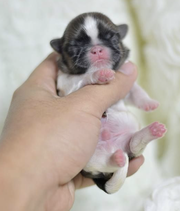Breeders IQ Test Years ago I spoke to a long time Shih Tzu breeder and she mentioned this "test". I would like to repost it here. If you are very serious about breeding, this is just some of the information you need to know. You also need someone to mentor you in your chosen breed. Many people think that breeding dogs is easy. However, the reality is quite different. If you do not have the competencies required to facilitate the breeding of your bitch, the raising of puppies, and the placement of puppies, it is irresponsible and unethical to breed until you have. As a starting point, if you can answer the following questions, then you'll be well on the track to being ready to breed. If you can't answer 90% of these, you have no business breeding until you can: THE BEGINNING OF THE SEASON When will a bitch first come into season? Should a bitch be bred on her first season? How old should a bitch be before breeding commences? On what grounds should a bitch not be bred from? On what days is a bitch fertile? How long is a bitch's season? BREEDING THE DOGS On what day's should a bitch be bred? What is a stud master and when should they be used? On what attributes is a stud dog selected? What health testing should both the dam and dog have prior to breeding? How old should a dog be before he is used at stud? What are the responsibilities of a stud dog owner? What are the important contract items to have in a breeding contract? On what grounds should a dog be neutered? What diseases can a dog get while being bred? When should a dog be allowed near in season bitch? How does the breeding actually take place? Does there need to be a tie for a breeding to have taken place? What is AI and when should it be conducted? Who should conduct the AI and what specific precautions should be taken? Why is the stud dog turned during a breeding? How many times should a bitch be bred? Can a litter have more than one father? Where must a bitch be kept while she is in season? GESTATION How long is a bitch's gestation? What special diet should the bitch be fed while in season, and while pregnant? Under what special circumstances should additional calcium be fed to a pregnant bitch? WHELPING What are the signs that a bitch is going into labor? What is the best type of whelping box arrangements? Where should the bitch be when she whelps? What are the signs that the whelping is going well? What are the signs that there are problems developing? When should a c-section be performed? What is primary inertia and the implications? What is secondary inertia and the implications? What is oxytocin? When should the vet be called for help? Should calcium be administered during whelping? What does green fluid indicate? How long should it take for a bitch to whelp? What is the incidence of puppy deaths in each litter? What is a breach birth, how often does it happen, and what are the problems that can result? What are the implications for a pup born out of the sac? How do you ensure that each placenta is accounted for, and what do you do if they are not? What should be done with the placenta? How do you resuscitate a dead puppy? How do you clear fluid from a puppy's lungs? How many extra set of hands should you have at a c-section? When should oxygen be administered to puppies? When should puppies first fed from the dam? How do you check for cleft palate? How are puppies who are deformed managed? CARING FOR THE MOTHER What should the dam be fed while she is looking after puppies? What are the signs of infection in the bitch? CARING FOR PUPPIES What are the signs that the puppies are progressing well? What are the signs that the puppies are in trouble? What is mastisis and how is it treated? What do you do if the dam's milk does not come in? How do you bottle feed a puppy, and what do you use? How do you tube feed a puppy? How can you tell if a puppy is feeding well? How can you tell if a pup has received enough milk? How can you check to see if a pup is dehydrated? What is fading puppy syndrome and how do you rescue a puppy from it? What are the common problems to be aware of when raising the puppies? When do you introduce "real food" to puppies? Why should puppies never be given "baby food"? Why should puppies not be given grains to eat? Should puppies be vaccinated? Should puppies be wormed? Under what conditions should a puppy be culled and how? Under what conditions should a puppy be wormed and/or vaccinated? PLACING PUPPIES How do you choose puppy buyers? What responsibilities do you have as a breeder for those pups? What sort of guarantees are you going to offer the buyers? How do you ensure your puppy buyers are going to look after the puppies? When and how do you temperament test puppies? How do you match the right puppy with the right person? When do you remove the dam from the puppies? When should the puppies be totally weaned? How are puppies house trained? When are puppies first socialized and how? What sort of puppy pack information are you going to provide to the buyers? When do you start training the puppies? What breeder support are you offering once the puppies have gone? I often have people call me who want to breed, and invariably their bitch has just come into season, and they want to breed without having the skills or the knowledge. At best, this is careless. If your bitch is in season, and you are asking questions now, then do NOT breed her. Wait until you are properly trained and mentored.
0 Comments
I get a lot of questions on what I do for treats as I do not feed commercial treats. Many are made in China and carry a lot of bad chemicals, melamine, plastic etc. PLEASE stop buying at the Dollar Store as well.
I am going to place the links here for treats that I have tried. When you see a recipe that calls for pumpkin, please insure you are using "Pureed Pumpkin or Pure Pumpkin" not pumpkin pie mix. And as with all treats, please give in moderation. If it calls for Peanut Butter, make sure the peanut butter does NOT CONTAIN XYLITOL. Peanut Butter & Pumpkin Dog Treats https://www.allrecipes.com/recipe/133123/peanut-butter-and-pumpkin-dog-treats/ Christmas Mint Apple Treats https://best-dog-treat-recipes.com/dog-treat-recipes/christmas-dog-bones/best-dog-treat-recipes.com/dog-treat-recipes/christmas-dog-bones/ Doggy Candy Canes (lots of work but don't be intimidated, the kids could help you roll out the parts for the canes) www.dogtreatkitchen.com/free-dog-treat-recipes.html Gingerbread Dog Cookies http://gonetothesnowdogs.com/gingerbread-dog-cookies-christmas-treats-how-to-make-homemade-dog-treats-recipe/ I will be moving the recipes over to the Info area after Christmas. Here are the periods in a dogs life per se. I hope this will help you in your understanding and training! Have fun!
Keep in mind that all dogs are individuals and don't read books so some of the timing for fear periods can be off. Neonatal: Birth to 12 days (Obtain nutrition and stay warm) Transition: 13-20 days (Eyes open but not seeing well until 21 days, puppy can crawl backwards and forwards now, begins to walk, first teeth “may” erupt around 20 days, tail wagging begins, reacts to sounds around 19 days but cannot locate source, moves bowels without stimulation.) Awareness: 21-28 days (First week puppy is able to use sight and hearing. This change happens abruptly so a stable environment at this period is critical. Can psychologically scar puppies if moved to new location. Pups have greatest need for mother and familiarity at this time. Learning begins in this stage, it is time to begin learning what it means to be a dog.) Canine Socialization: 21-49 days (3 to 7 weeks) (Puppy learns to use species specific behaviors that make him a dog. Practices body postures, facial expressions, and vocalizations and learns their effects on siblings. Plays chase games to learn coordination and timing, greeting behaviors to learn body postures and fight games teach him use of his body. Learns to accept discipline during this time from his mother. Learns bite inhibitions and weaning. Mother dogs set up the puppies for these lessons. Very important to let mother dog stay with pups to teach these lessons.) Human Socialization: 7 to 12 weeks (Best time for bringing pup to new home. Best time to introduce pup to things (in a positive manner) that he will be exposed to. Brain waves are same as an adult dog at this age. Most rapid learning occurs. LEARNING AT THIS AGE IS PERMANENT. ) First Fear Impact: 8-11 weeks (Any traumatic, painful or frightening experience at this time will have a more lasting effect on the puppy then if the event happened at any other time. Puppies perception of the event is important not owners. NO elective surgery should be done at this time. Puppy classes at this age need to be non-stressful for pup.) Seniority Classification: 13-16 weeks ( Also known as age of cutting teeth and apron strings. Pup begins testing to see who is going to be pack leader. From 13 weeks on if puppy attempts to bite even in play it is an attempt to dominate. Pup is attempting to clarify and resolve the question of leadership. Establishing rules for pup extremely important at this time.) |

 RSS Feed
RSS Feed